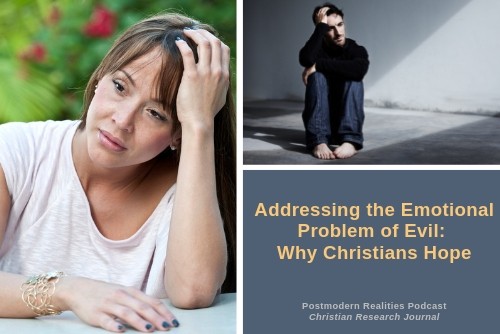Since it is a safe generalization to say that every person who has ever lived has experienced evil in some form or fashion, including pain and suffering, answering the problem of evil is a formidable task. Due to the breadth and depth of the effects of evil, the problem of evil is not only the number one intellectual obstacle to belief in God but also the number one emotional obstacle to belief in God. The emotional problem of evil, an aversion to a God who would allow suffering and evil, is even more difficult to answer due to the power of the emotional objection. Essentially, the answer to both the intellectual and emotional problem of evil, though sounding simplistic, is the Christian God. Whereas the intellectual problem of evil elicits a philosophical response with cold, hard facts and argumentation, the emotional problem requires a counselor’s response with a genuine concern for the skeptic’s suffering. Many times, we may hurt inside, angry with a God who would allow us or others to suffer. This problem may be one that momentarily undertakes no argumentation at all but requires a loving friend who will be a compassionate listener. However, this is also a time when apologetics and our study of the truth can make a striking impact, both for the sufferer and for the one grieving with him or her.
This Postmodern Realities podcast episode is a conversation with Journal author Mary Jo Sharp about her Christian Research Journal feature article “Addressing the Emotional Problem of Evil: Why Christians Hope”.
We’d also like to invite you to subscribe to the Journal and join our team of print subscribers. To subscribe to the Journal, please click here.
Please partner with us and help us to continue to create free online-exclusive content and this free podcast. We are offering a special promotion for two books mentioned in this episode. For your gift , you can receive either The Problem of Pain by C. S. Lewis or Why Does God Allow Evil by Clay Jones. To partner with us, click here.
Another article by this author
Did Muhammad Believe in Women’s Rights?
Other podcasts and articles about this topic:
Why Did God Let That Child Die?
Episode 114 Why Did God Let that Child Die?
Why God Permits Evil with Clay Jones
Responding to Evil Christianly
When Religious Doubt Grows Agonizing
Addressing the Problem of Evil
Steve Jobs, Jesus, and the Problem of Evil
How Should Christians Approach the Problem of Evil?
Sci-Fi, Free Will, and the Problem of Evil
